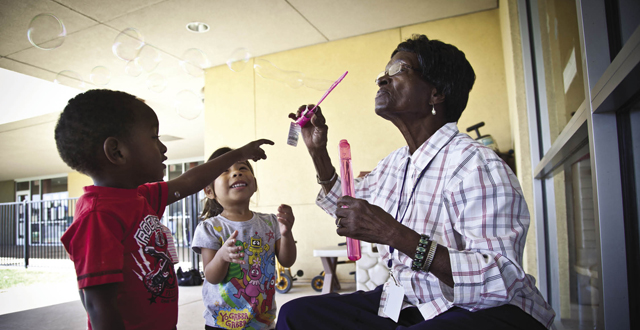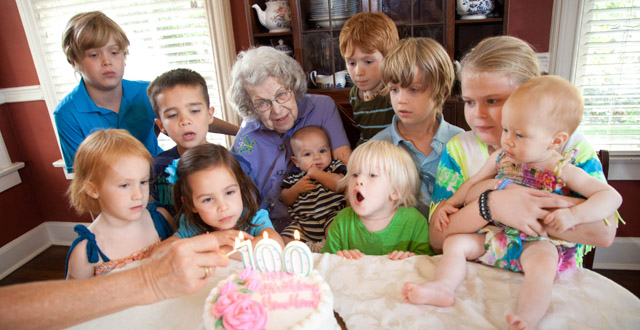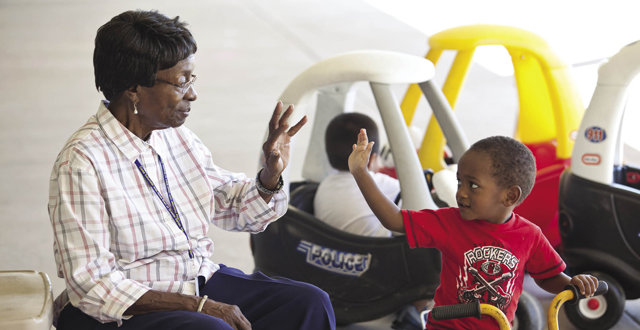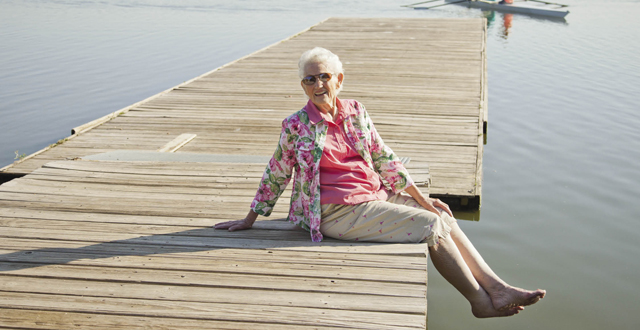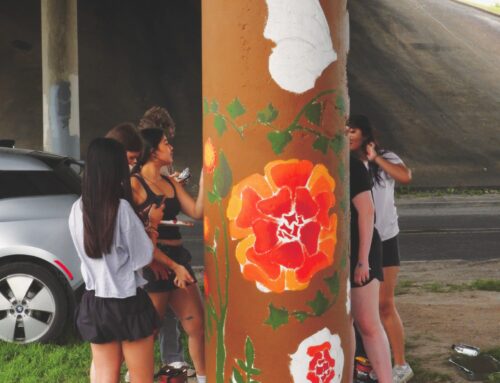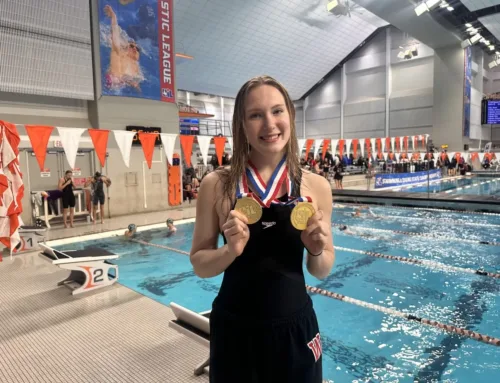Like fine wine, some things get better with age — particularly these neighborhood residents. From farm life to neighborhood activism, you could call them the original hipsters of East Dallas. Today, they continue to make every moment count.
Nancy Cole
a vivacious 71-year-old artist and marathoner, shares her memories of growing up in East Dallas, her personal thoughts about youth and getting older, and her secrets to staying young on the inside and beautiful on the outside.
How long have you lived in East Dallas?
For about 10 years. Of course, I’ve lived in Dallas all my life. Actually, I spent my early years in East Dallas, and then we moved to Fort Worth for a few years, and then we moved back to Dallas. Then I moved to East Dallas because I have cousins here. I’m an only child, so I’m really close to my cousins. Plus, I wanted to be near White Rock Lake. I have a lot of running friends here.
So when you run, you run at White Rock Lake?
Most of the time. I run several times a week over there.
Why did you begin running?
I had a friend that ran, and every year I went to Arts Fest because I’m an artist, and I saw all these people with T-shirts that said, “Run for the Arts.” I thought, “I want to do that.” My friend helped me get started, and that was my goal, to do Run for the Arts.
Do you think that keeps you young?
Absolutely, that and teaching. Being around young people all the time keeps you young.
Something about being this age, you realize how beautiful youth is. I look at my students, and I tell my students, “You’re so beautiful. You don’t even realize it, but you are. Youth is just beautiful.”
Aging can also be a beautiful thing, too, don’t you think?
I’ve never really thought about it. In fact, I kind of dreaded it. Forty was so painful for me.
Really? Why?
Every 10 years, it’s just like, oh, I’m 50, and I’m 60… but then 70, was just like, OK, I’m 70 and I’m happy to be 70.
So was there an age that you reached when you felt like you were getting older?
When I felt old? I’m not sure. Maybe I haven’t reached that. I didn’t want to be 40 because that just sounded so old. It seemed like 30 was OK, but 40 was really old.
Do you think it was more other people’s perceptions of what is “old”?
Oh yes.
So then age really is just a number?
I think it is, but when I do a long race, it takes me longer to recover. I’ve started noticing things like that. A few little aches and pains here and there. But I did my best running when I was in my early 50s; that was my fastest. Of course, I didn’t start running until I was 38, but in my 50s, that was my peak. I started slowing down probably at 60.
Where do you teach?
I teach at DBU [Dallas Baptist University]. I taught high school for a long time, until I retired. After that I went to DBU as an adjunct professor. I loved high school, but I love college, too. I love teaching. I teach sculpture, bronze and design. I’ve always taught art. I have a degree in English as well, but I never wanted to teach it.
And you were on the White Rock Artist Studio Tour. How long have you been involved in that?
For the 10 years that I’ve lived here, and it’s so much fun. I had my studio built right after I moved here. I had all this stuff, and it had to go somewhere. I’ve always been involved in art, so I used to always come to the studio tour. I had a lot of friends who were on it.
How have you seen your artistic process change over the years?
I’ve really loosened up a lot. When I first got out of college, I was really serious about my paintings. They were all very realistic. Now I just have fun. Sometimes I just sit out here and laugh when I make something. I just think, “This is so much fun,” and if somebody likes it then great.
When do you think that happened, that you started to loosen up?
I think once I started teaching, being around students who are so uninhibited, I started to loosen up. That’s one of the things that I work with, with my students at DBU. They come in and they’re so nervous. They want everything to be perfect. I tell them to just relax and have fun. I think that’s probably an age thing.
Do you think you create for yourself or for other people more or less as you get older?
Probably more for myself. If it’s not fun, I don’t do it, and I really don’t like for people to ask me to make stuff for them. I just like to do what I want to do. When I was younger, I wanted to please other people, and I wanted to convince myself that I could do it. My paintings were very realistic.
Do you have any favorite East Dallas memories?
When I was a little girl, my uncle built a house in Casa Linda. My cousins and I would climb up on the swing set and wave to the trains. When I looked at this house, I really liked it. We came out in the backyard, my realtor showed it to me, and I said, “Is that the railroad track?” He said, “Yes…” I know he thought, “There goes that sale,” and I said, “I just love the train!” He said, “Oh good.” Because it’s right here. Then me and my cousins were talking one day, and it’s the same train that runs through Casa Linda. So that’s probably why I love that train. My cousins still live in Casa Linda, right across the railroad track.
And my cousin built Big Tex — the original one. We just cried last year. The mayor bought the frame and asked Jack to make it a big cowboy, so he did. He designed it and built it.
And I used to swim at White Rock Lake. That’s something I did a lot, with all my cousins. They stopped letting people swim in it, I think in the late 50s or early 60s.
OK, here are some flashback questions: Do you remember your first job?
My very first job was working at Mt. Lebanon Baptist Camp. My uncle was the manager, so he let me work out there. And then I worked at Titches downtown all through high school. I made 75 cents an hour, and when I graduated high school, I got a raise to $1 an hour.
Did you have a favorite fashion trend?
I don’t know what was my favorite, but I’ve watched everything come back. At the time I thought the hair bob was really cute.
How about phrases?
“Cool” is one that has survived the ages. That’s the first thing I thought of. In high school everything was “cool.” I thought about that the other day. Something happened and I thought, “That is really cool,” and then I thought, “I don’t want to sound like I’m trying to be a teenager at 70,” but then I thought about how things have always been “cool.”
Do you ever find yourself saying things that are out of date?
One time I said something was really “spiffy,” and my daughter said, “Mom, don’t say ‘spiffy.’ That really dates you.’ “
Do you have any advice?
Stay silly. I have some giggle friends, and we get together and just giggle and giggle. We just never outgrow giggling.
Uralee Farell
is “a farm girl in the big city,” as her son, Dan Farell, puts it. Despite the fact that she celebrated her 100th birthday in October, she still lives by herself and takes a walk around her neighborhood every day.
How long have you lived in East Dallas?
Uralee Farell: Since 2005. I lived on a farm all my life, until I moved here to be with my family. I was up there on the farm all by myself, and then they [her son and grandchildren] moved me over here. I grew up near Commerce in a little town called Fairlie. I lived there practically all my life. I grew up in a large family. I had four sisters and five brothers, and now they’re all gone except one sister, the youngest one. I was the third oldest, born in 1913.
So you turned 100 in October. What’s your secret?
UF: One day at a time. That’s all you have to do, just hang in there. You just keep on having birthdays and after a while you get old.
Very true. Plus, I bet you ate healthier back then before all the processed food we have today.
UF: Well it was different, that’s for sure. I’ve seen changes.
What kinds of changes?
UF: Well, our living was different. I grew up on a 50-acre farm, and we ate more off the land than we did from the grocery store. My mother raised a big garden, and even with her big family that she took care of, she was still able to can fruits and vegetables for the winter. We had an orchard where we grew our own fruit, and we had pigs and chickens and, of course, cows for milk and butter. So we practically raised our own food. Things were so different then.
Did you help around the farm?
UF: Oh yes, when a kid got big enough to hold a hoe, he was big enough to get out and work and help raise food. We had to hoe and we had to pick cotton when the cotton came in, so we were busy most of the time.
What was your favorite job?
UF: Favorite job? I don’t know that I had a favorite. We just did what we had to do.
How about in your spare time, do you remember things you did as a teenager?
UF: I remember very well the first moving picture I ever saw, back in 1929. We went in a group of school kids to Greenville to see the movie. Someone drove us over there. Can you imagine? All we had were still pictures until about 1929 when the first moving pictures came out. Seeing the pictures moving was a big deal. I don’t remember what the picture was, though.
The Great Depression, did that impact your family at all?
UF: Well, we didn’t have any money, but then nobody else did either, so we didn’t know any different. We grew our own food, so honestly, we didn’t know any different. We got two new dresses every time school started, and that had to last.
When did you get married?
UF: In ‘31. My husband died just a few days before our 67th anniversary. His name was Charlie Farell. He was about eight years older than I.
How’d you meet him?
UF: I was walking to school, and he was driving his sisters to school in a Model A, and he stopped to give me a lift and I was impressed with what a good-looking fellow he was. When I met him I was 14, and then I think I was about 15 when we started finding each other favorites. A date back then wasn’t two at a time; it was a whole group. On Sunday afternoons a group of the young people from the community would get together and go for a ride or go for a picnic. We never dated one-on-one. I was 18 when we married, and he was about 26. We eloped.
You eloped? Why?
UF: I was 18, and I knew my mama would tell me to wait. We went to Oklahoma and went to the home of a Baptist minister who performed the ceremony, and then we called back … and in those days, everybody didn’t have a phone, like now. We called Vincent Carr who was a banker and told him to please let our family know that we weren’t coming home. He let everybody in the community know.
When did you get your first TV?
UF: In the early ’50s.
Dan Farell: I can tell you the very first thing I remember seeing on the television right after we got it. It was Eisenhower’s inauguration. We had the only TV in the community, so the community came to our house.
UF: Do you remember that? We had a whole room full of kids. The whole school came down.
DF: That might’ve been the reason you got the TV because that was coming up.
Do you remember your first car?
UF: I remember my dad’s first car. He had a Model T. It was the only car he ever had. Charlie had a Model A, I think. A Model A was a little improvement over the Model T.
DF: You didn’t have to hand-crank it like you did the Model T. Can you imagine having to hand-crank your car before using it?
Did you have a favorite band growing up?
UF: Well, my dad was a fiddler.
What are some of the big turning points you faced later on in life?
UF: Hmm …
DF: Moving to Dallas was a big turning point
UF: Yes. I lived in the farm all my life, so it was different, but being close to my family made it worth it. I’m not close with any of my neighbors, except the man across the street, Joe. He makes preserves, and he brings me a jar every time he make some.
DF: That’s probably because she makes him cookies.
UF: He’s a good neighbor.
DF: Her nature is to reach out to people. She walks to the church and to the beauty shop, and she even walks to the grocery store even though we have all cautioned her not to cross the busy street. She says, “Nobody is going to run over an old lady with a walker.”
UF: And they haven’t yet.
Was there ever a point when you started feeling old?
UF: Well, I don’t know when that point came; it’s been such a gradual thing. I don’t feel young. There’s no doubt about it, when you get to 100 you know you’re old. But I’ve been grateful for good health. You’re aware of your limitations.
Laura L. Watson
grew up in East Dallas before marrying her late husband, a musician, and traveling the country. Eventually, the 91-year-old ended up back in East Dallas, where she lives to this day. After retiring from a career in the mental health industry in 1980, Watson began volunteering through the Foster Grandparent Program. Today she volunteers four days a week with Early Head Start in East Dallas.
So you grew up in East Dallas, but you haven’t always lived here, right?
I was married to a musician, so we traveled a lot. We lived in New Mexico — Santa Fe, Albuquerque. He played in a trio. Of course he played around here, in Dallas, at different clubs, like the Rose Room. He played in so many clubs around here. When I first met him, he was playing with a band out of New Orleans.
When did you meet him?
In 1939 and we married in ’41. His name was Thomas Watson. We were married 54 years. He was in the service, went to Japan during World War II. He passed away in ’97, when he was 85. We didn’t have any children, but we raised our niece, Yvonne.
What did your husband play?
He played piano — classical, jazz, you name it — but he taught all instruments. I still have his piano, too.
Do you remember your first job?
I’m the fourth of seven, and so I didn’t work until …. I don’t think I started working until World War II. I can remember I worked in a factory, a shirt factory. Of course, I went to college, to El Centro downtown until they got East Field built. I got a Bachelor of Science in social work, and then I was the liaison person between the City of Dallas and Terrell State Hospital. I did that for almost 20 years before I retired.
My class was the first to finish from Lincoln [High School] when it was built. We were the first class. It was really fun times. Of course I met my husband, but my parents didn’t want me to get married because they wanted me to go to college. So I asked my father if he would send me, and sure enough he did. I was working and trying to go to college. It was tough. Sometimes I wanted to stop, but my husband told me, “You can do it. You can do it.” So he was very helpful. And I did it, and he was very proud. He was a good husband. I couldn’t have found a better person.
Do you have any favorite East Dallas memories?
Well this was like the country out here, with horses and chickens. I can remember the circus would come into town. That was a big thing for us. And then when the fair came, the blacks had one day they could attend; that was fun. You had the carnival, and it was fun. The baseball team. My brothers would play baseball.
What do you remember about the circus?
Being afraid of everything. I was afraid of most everything back then. I was just a scared little kid, and I blame it all on my older sister. She protected me so much.
Did you eventually grow out of that?
Traveling around with my husband all the time, he made me tough. I would have to stay in hotels and motels, and so in that way I got to where I wasn’t afraid.
How about historical events, do you remember the Great Depression?
I was young. My father always had some type of job, so we were never on welfare. His mother was living, and she had a big farm in Texas, and she supplied us with sacks of potatoes, peas and meat, and stuff like that. Then my mother’s mother lived around the corner, and she was very helpful. So my parents had their own welfare.
Obviously World War II was a big part of your life as well. What was it like for your husband to be away fighting?
It was scary. My second brother and my husband were in World War II.
Did Thomas enlist or was he drafted?
Oh no, he didn’t enlist. I didn’t know that he was moving around to keep Uncle Sam from getting him, to avoid the draft, but his family did [know that]. He was working with a band in West Texas, in Midland, and Uncle Sam was after him. So his mother — they all had moved to California — and they wanted him to go out there, but I didn’t want him to go. So he was just going to visit, and that’s where they got him, was in California.
When he went into the service, my mother wanted me to come home to Dallas because my father had died. So I came home, and that’s when I started working.
Another thing I’d love to hear about is your perspective on segregation in Dallas.
I spoke about the fair earlier. We had one day because the black people couldn’t go anytime. It was places like the big hotels or the big cafeterias that the black people couldn’t go. Oh, and we had streetcars instead of buses, and there was the sign up for coloreds and for whites. Coloreds had to sit behind the sign.
Working with young people now as a volunteer at Head Start of Greater Dallas, have you seen any change in the younger generation?
These children, they start out as children of all races, and they didn’t know the difference. They had to be taught, and that’s the way it was when I was growing up, they had to be taught to not like certain people.
Since you traveled a lot, did you notice any differences between regions?
They said Texas was more prejudice, but there were a lot of places that we went, in the East and West coast, where they were more prejudice than here.
How about some flashback questions: Do you remember your first car?
We didn’t have a car until ’51, a Chevrolet.
How about your favorite band?
I really liked Duke Ellington. That was rhythm and blues.
Did you have any favorite celebrities?
Let me see … Ella Fitzgerald, Sarah Vaughan, movie star Audrey Hepburn, Claudette Colbert.
Do you remember the first time you ever went to the movies?
I believe it was “Imitation of Life.” That was really something because it was on Christmas day. They let us go to the movie on Christmas and because it was a very, very popular movie it ran for two or three weeks. It was downtown at the Majestic Theater. Of course, colored people had to sit up in the balcony, but we got to see it.
Any favorite phrases?
Hm …
Like “cat’s pajamas” did you ever say that?
Oh yes! Cat’s pajamas *laughs*
How about fashion trends, any favorites?
In the ‘30s, everybody was wearing fishtails. And at one time everybody was wearing short haircuts. I wanted mine cut, and my mother didn’t want me to cut it, but finally she gave in.
Were there any fashion trends you didn’t like?
I remember I didn’t like the … what do they call those big legs? Oh, the bell bottoms. I really didn’t like the bell bottoms, but I had some because everybody else was wearing them.
Have you seen your outlook on life change as you’ve grown older?
I used to draw back from people. I wasn’t as friendly and outgoing. I really don’t know why. Maybe it came with age. And I used to be more critical than I am now. I’m Catholic, so maybe I’m taking my religion more seriously. I don’t make excuses, but I overlook things that people do more than I used to.
Ethal Wise
is an 87-year-old who’s been in Dallas since the mid-’40s. She takes time to tell us about her life and about the “Dallas of yesterday.”
What did Dallas look like when you moved here in the mid-’40s?
Oh my, it was entirely different. We had the streetcars, and I came here during the war [WWII], so nobody had cars then. You either walked or rode the streetcar. Then they started the buses. Then they started the electric buses, and they got rid of the streetcars. Plus, most of the things you wanted were in downtown Dallas. The shopping was in Highland Park. Sometime after the war, or during the war, Casa Linda was built. Most people only had one car. Some people didn’t have cars, but we happened to have one because my husband got one as soon as he got out. It was a Ford Coupe.
Earlier, you talk about the “Dallas of yesterday.” What’s a story that you feel like represents that Dallas?
Well, back then, we didn’t have cell phones. My daddy worked for Frisco Railroad. He had a little apartment in Ardmore, Okla., and after mama died he was lonely. So I was going up, taking the two little ones to visit. I would’ve gone up Northwest Highway, around the circle, to go I-35 North to Ardmore. Daddy calls Whit [short for Whitby, Wise’s late husband] at the office, saying he’s not going to be in Ardmore because the train has come to hook up his apartment to go to Antlers, Okla., which was about 100 miles east. So by the time I got there, he wouldn’t be there. So Whit calls the Dallas police to say, “She’s going to be going around the traffic circle, headed that way. She shouldn’t do that.” So I was headed up towards Denton, and somewhere in there the Texas Highway Patrol pulls me over, and I think, “Oh what’ve I done?” They say the Dallas Police had called them to tell them they must’ve missed me at the traffic circle, that I shouldn’t go to Ardmore; I needed to go to Antlers, Okla. It was just a different Dallas, a time gone by.
And let me tell you a tale about my firstborn. When I got pregnant with my first child, my father says to me: If it’s a boy, he’d give me $10,000, but for a girl I only got $5,000. In 1949, $10,000 was a lot of money. Of course there’s no sonograms back then, so you didn’t know until the baby came. And, of course, it’s a girl. So Whit takes that $5,000, goes down to Mercantile National Bank. Then, we get a letter from R. L. Thornton saying [my daughter’s] father had been down to open a savings account, and he said he wanted to welcome her to the bank. He said, if she came downtown to give him a call, he’d take her to lunch. So we took her downtown, and we had lunch with R. L. Thornton. It was a different Dallas.
With my fourth child, her doctor, Dr. Strother, called her “Suzy.” I said, “Dr. Strother, is it a Suzy?” He opened his cabinet — this is a doctor now — he opened his cabinet, and there were tick marks on both sides, girls and boys. He says, “She’s in the Suzy section.”
Do you remember your first job?
During World War II I worked at the telephone company, and then I worked at South Western until I married. Then I didn’t work after I was married in ’49. I didn’t work again outside the home until I started working at SMU in ’72. I took care of kids, and I took care of my two sisters who had cancer, and I’ve always done a lot of stuff outside of home. I took a Girl Scouts troop from Brownies all the way through high school. I gave them up when they were 11th graders at Bryan Adams.
What did you do at SMU?
I was assistant registrar at SMU under John Hall, who’s still registrar. When he went up as registrar, he took me up as assistant registrar. I’ve always been thankful for that. I was at SMU for 25 years total.
And when did you get involved with For the Love of the Lake?
Marci Novak started for the Love of the Lake. I wasn’t one of the first, but I started Second Saturday Clean-up probably the second year after they started. I was on the board … how many years? I forgot. Probably eight or 10, at least, at the beginning there. I still enjoyed going to the board meetings, but I decided the younger people who’d come in needed to be on the board.
And the Dallas Arboretum?
In ’98 I started at the Arboretum volunteering there. I’ve been on the VAB [volunteer advisory board] there several times because you serve two years and then you rotate off the board. I rotated back on in another position, rotated off and rotated back on. I’d say I’ve done that six years, at least, total at different times on the VAB at the Arboretum.
So you do a lot of things in East Dallas. Why is it important for you to be so involved?
Well, I enjoy it. It’s a purpose. It’s a reason to get out. It’s a reason to get up. It’s a reason to go. I just feel like leaving — especially with For the Love of the Lake, when we planted the trees last fall — I feel like I’m leaving a better future for my little great-grandson. Because that is the Dallas of tomorrow.
When Whit died in ’93, my work at SMU was a huge blessing. It was hard, socially, to be alone. But the fact that I was out, that I was working at SMU was a blessing; it really was. My friends from SMU, they were kind of a filler. They gave me a purpose, helped me fill the void. For the Love of the Lake has been the same way, although I’m not as active now.
If you could tell your young self anything, what would it be?
Probably, I’m not sure, but I think to try to understand when people differ from you, to try to go from their point of view to yours.

